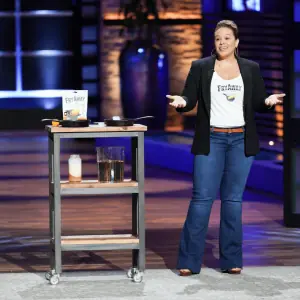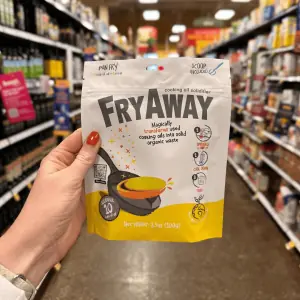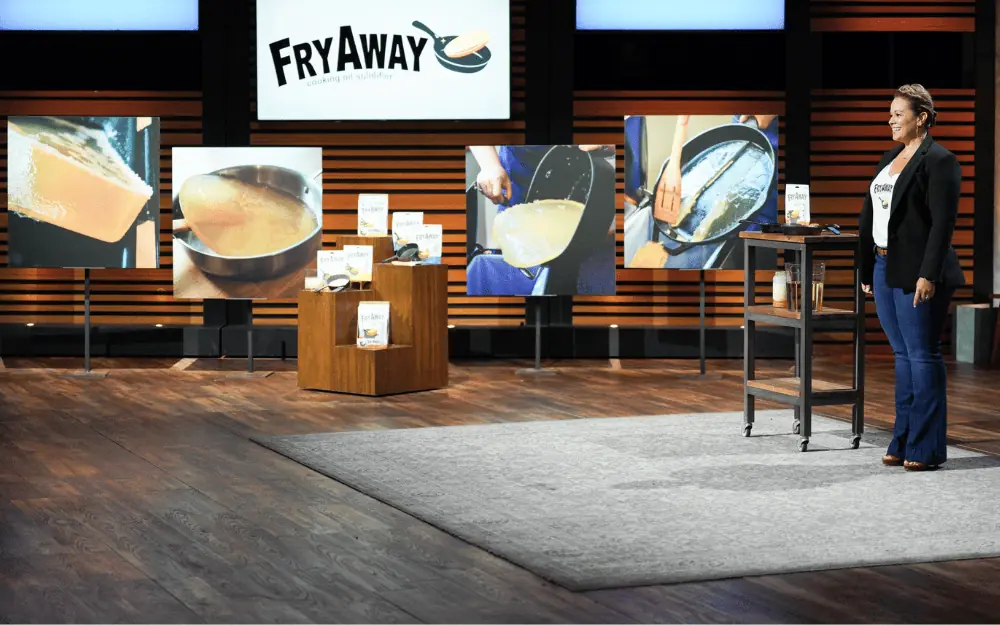FryAway seeks to help cooks avoid pouring cooking oil down the kitchen drain, where it can do serious damage to both plumbing and sewer systems. FryAway is a 100% plant-based, non-toxic powder that turns cooking oil into an organic solid, which can then easily and safely be disposed of in household trash. But will the Sharks be interested enough to grease the wheels of this new, organic, oil disposal product? Read our FryAway Shark Tank update to learn more.
What is FryAway?
FryAway is a company which manufactures a 100% plant-based, non-toxic powder that solidifies used cooking oil for easy and safe disposal in household trash. The company is located in Concord, New Hampshire.
FryAway seeks to help home cooks avoid pouring cooking oil down the drain, where it can cause major damage to both plumbing and sewer systems.
Who created FryAway?

FryAway was founded by Laura Lady in 2021. Laura attended Louisiana State University for her undergraduate degree, earning a BS in International Trade and Finance, and then she went abroad for graduate school, studying at both the International University of Japan, and SDA Bocconi, in Milan, Italy, where she received her MBA.
After graduating from college, Laura spent many years working in international marketing, including a two-year stint living in Seoul, South Korea. Prior to founding FryAway, Laura also held senior-level marketing positions for three large toy companies, Fisher-Price, Mattel, and Lego Group.
How did FryAway get started?
On the FryAway website, company founder Laura Lady describes how the idea for FryAway came to her in a simple, organic way. She says that she has always loved to cook because she loves to eat, and she really has a soft spot for fried foods, but she also knew that frying food at home is messy. Laura said that like for everyone else, “Getting rid of used oil usually involved paper towels, plastic bags, jars and jugs, and most of us have even resorted to pouring oil down the drain.”
Laura knew that dumping cooking oil and grease down the drain were not the answer, so she decided to go on an internet search. She asked her favorite search engine “how to properly dispose of used cooking oil?” And she was horrified to learn how much oil ends up where it shouldn’t, stuck in the plumbing or the sewer.
She says she learned online that oil can combine with other waste products along the way, creating huge clumps of solidified oil and other waste called Fatbergs, like an iceberg, but made of fat. These fatbergs can cause major disruptions both in sewer pipes and to the environment, so Laura was determined to find a solution, and she headed to where she does her best work: the kitchen.
Laura went to work in her kitchen at home and worked until she had created the recipe for FryAway, the 100% plant-based, non-toxic powder that magically solidifies used cooking oil for easy and safe disposal in household trash.
What happened to FryAway before Shark Tank?
FryAway founder Laura Lady launched FryAway just one year before her Shark Tank episode was taped. During her Shark Tank taping, Laura told the Sharks that she had decided to start small and test the market for her new product, so she spent $2k on a machine to manufacture FryAway, and she set up shop in her garage. Well, her idea of starting small quickly changed, as in her first year in business, FryAway had just under $700k in sales, and at the time of taping her pitch, Laura was still manufacturing everything in her garage at home.
Laura first built an online Shopify store, and saw little action, but she then put her marketing knowledge to work and started to get lots of free public relations by approaching many media outlets and taking to television and the internet to educate consumers about the problems caused by the disposal of cooking oil, and how FryAway solved these problems.
Next, Laura started to purchase ads on Amazon, and this is when the business really took off. During her pitch, she told the Sharks that almost all of her sales were online, and mostly through Amazon. She also told the Sharks that downside of the Amazon sales resides in the fact that she had spent nearly $300k in Amazon advertising and fees over her first year.
At the time of the Shark Tank taping, FryAway was also scheduled to launch into 1,100 Kroger stores within a number of months, and while the company had no debt and had positive cashflow, Laura would need to secure financing because the Kroger purchase orders were going require funding at a level that her cashflow could not finance.
What do customers think of FryAway?

FryAway has obviously done a good deal of business on Amazon, as we discovered nearly 6,000 global ratings for the company’s FryAway Super Fry Cooking Oil Solidifier. It also is an Amazon Choice product in the Kitchen Cleaners category.
FryAway has an overal rating of 4.3 out of 5 stars on Amazon, and 81% of customers rate the product at either 4 or 5 stars, with 8% of Amazon purchasers rating FryAway at just one star.
What are customers saying about FryAway?
One happy, verified Amazon purchaser was pleased with both the company’s product and customer service, “The seller messaged me before the product arrived with a bunch of information on it to make sure I understood how it worked! It congealed the canola oil perfectly and made cleaning it up super easy.”
Another satisfied Amazon customer said that FryAway works like magic:
“I started buying this a few months back. I am a self-taught baker and chef, frying at least once a month. And disposing of the oil was very difficult. With this solidifying agent, you just have to sprinkle it into the hot oil, wait until it cools, and then dispose of it in the the regular trash. It makes for an extremely easy clean up, and is well worth the price. Highly recommend.”
Most of the critical comments about FryAway appeared to be centered around the price of the product and value for money. One Amazon reviewer wrote simply, “It works, but it’s not worth the cost!! It’s more expensive than the oil itself.”
Another price-critical reviewer offered both a comment on the price of FryAway, and a work-around to produce the same results while saving money:
“Fry Away will turn liquid oil into a solid brick that you can put into a trash bag with no spillage. It’s great. You avoid drain clogs and messy drips.
That said: it’s mostly stearic acid. You can buy stearic acid in bulk on this very website (Amazon), for a lot less money. You might have to use a bit more in order to turn your liquid oil into a solid instead of a jiggly, jelly-like mass. But you can also buy an entire pound of stearic acid for slightly less than the cost of this 4.2 oz package of FryAway.”
While there is pushback concerning price in some Amazon reviews, most customers say that the product works well, and it is worth the slightly premium price.
When did FryAway appear on Shark Tank?
FryAway appeared on Shark Tank in Season 14, Episode 13, which aired on January 27, 2023. FryAway pitched to regular Sharks Mark Cuban, Lori Greiner, Kevin O’Leary, Daymond John, and Robert Herjavec.
FryAway appeared in Season 14, along with Kudos Diapers, another eco-friendly means of disposing of an unpleasant household waste product.
What happened to FryAway on Shark Tank?
Laura Lady, founder of FryAway entered the Tank and told the Sharks, “There’s a large, stinking, rotting monster afoot, and every day, it grows larger, greedier, and eats everything in its path. And I’m not talking about Mr. Wonderful, I’m talking about Fatbergs.” She had to pause a moment here, as the Sharks were howling at Kevin O’Leary’s expense.
Next, Laura shows a gross photo of a huge Fatberg, shaped like an iceberg, but a giant, congealed mess of cooking fat, which has been removed from a sewer. And, she told the Sharks, this is what happens when cooking oil is poured down the drain. She explained that cooking oils collect other solids along the way, and they can form huge blockages, called Fatbergs, which can seriously damage plumbing and and sewer systems.
Laura then described that almost everyone has poured a little hot water and dishsoap on top of some cooking grease in a pan, and washed it down the drain. She also said that others also sometimes put the oil in plastic bottles, bags, or other containers to be put in the trash, thus, adding more garbage to the cooking oil.
Finally, Laura told the Sharks that since she really loved to cook, she wanted to find a better way to dispose of used cooking oil. So, she invented FryAway, a 100% plant-based, non-toxic powder, which magically transforms used cooking oil into solid, organic waste.
The Sharks watched a short video of FryAway converting used cooking oil into a solid, and they also inspected pans of converted oil in front of them. When Robert looked at the solidified oil in the pan, he asked, “What’s this?” And he learned that the pan contained vegetable oil which had been solidified with FryAway. Kevin O’Leary quickly asked if it worked on peanut oil as well, and he learned that FryAway works with any type of oil.
Lori Greiner then wanted to know if the idea was that the oil then goes into the garbage rather than the sink, and Laura responded, “Not only going in the garbage, but without a separate bag or container.” Laura also told the Sharks that vegetable oil will decompose naturally in about 30 days.
After a bit more discussion about the benefits of disposing of used oil with FryAway, Kevin O’Leary wanted to hear about Laura’s sales, and he learned that the company just celebrated its first year in business, and they had just under $700k for the first year, and surprisingly for most of the Sharks, FryAway was cashflow positive within two months.
Kevin appeared interested, as he wanted to know where FryAway was manufactured, and he seemed surprised to learn that Laura was still making it in her garage. Laura then explained to the Sharks that she wanted to start small to try out the product, so she purchased a machine for $2k and decided to make FryAway in her garage at home. However, after only a short period, the product really took off.
Lori Greiner wanted to know more about Laura’s background, and she learned that Laura had worked for 18 years as a toy marketer for some of the biggest brands in the world, and that she came from a family of risk takers, as her father immigrated to the US from Honduras with only $10 in his pocket. Lori also discovered that Laura speaks 4 languages fluently.
Robert and Mark Cuban next wanted to know how Laura grew the business so quickly in a year, and she told them that most of the growth came from both free media which Laura had been able to rustle up, along with a large Amazon advertising campaign.
The Sharks were also very pleased to learn that FryAways 4 SKUs range in price from $9.99 to $50.99, and the cost to make them ranges from $.96 to $1.96. However, when the Sharks heard that the company’s net margin was only 9%, they were a bit less impressed; however, Laura explained that her greatest expense was about $300k, which she had paid to Amazon for advertising and fees. Laura said simply, “Amazon is makin’ bank on FryAway.”
Finally, Laura revealed to the Sharks that FryAway would be launching into retail, in 1,100 Kroger stores in the coming months.
After a very competent presentation by Laura, the Sharks appeared ready to swim or take bait.
Did FryAway get a deal on Shark Tank?
FryAway successfully landed a deal in the Tank. Mark Cuban and Lori Greiner agreed to invest $250k in return for an equity stake of 22% in the company.
Kevin O’Leary revealed his hand first, as he told Laura that while he thought that he could help the company with Chef Wonderful backing the product, he said that he wouldn’t be able to do so because he doesn’t believe in fried food, so he doesn’t fry when he cooks, and he doesn’t eat fried foods.
Daymond followed Kevin to the exit, saying that he didn’t see where he could really add value for Laura, as she could do herself any of the things he might suggest. Robert spoke up quickly and said, “I’m all in on Laura, but the category, fried food, is something that’s not exciting for me.
Two Sharks now remained, and next, Mark Cuban addressed Laura, telling her that he thought she was great, but the the trend was moving away fried foods, but before Mark could declare himself out, Laura interrupted him to tell him that there was huge potential in the international market, and this seemed to give Mark pause.
While Mark was thinking about the international potential for FryAway, Lori Greiner came in an made an offer of $250k for 20%. Mark Cuban then asked Lori if she wanted to split the deal, and Lori was willing to split the deal for two Sharks for $250k at 25%. Laura then tried to get the pair of Sharks back down to 20%; however, they were unwilling to go that low. Mark made a final counteroffer of 22% for two Sharks, and Laura said, “I think it’s a winning combination. It’s an honor. I say yes.
FryAway Shark Tank update, what happened after Shark Tank?
Like many Shark Tank businesses, FryAway experienced a strong Shark Tank effect, but with a twist, an ice storm four days after its episode aired caused major delays in delivery for customers who ordered the product after seeing FryAway earn a deal in the Tank.
A few moths after FryAway’s Shark Tank episode aired, founder Laura Lady, gave Jo Pardo an interview on his Super Entreprenuer YouTube program, and she provided some insight into both her Shark Tank experience, and the ice storm which followed the airing of her episode.
Laura told Pardo that Shark Tank only tells businesses that their episode is going to air about three weeks prior to the air date. And Laura said that because she had very short lead times for her product, she hoped that she could prepare for the increase in business, so as soon as she received notice from the producers, she flew immediately to Dallas, where both her new manufacturer and a new warehouse are located.
She felt that she had done everything possible to make sure that the company could manage a huge increase in demand, and she indicated to Pardo that just two hours before the episode aired, she finalized a deal to connect her new warehouse in Dallas with Amazon in the event that Amazon sold out of FryAway in their primary warehouse.
On the weekend after the episode aired, Laura said that she and her husband, along with their 5-year-old, spent the entire weekend packing and shipping the one SKU that she was still shipping from her garage, and that they were very tired, but excited and happy. However, on the 4th day after FryAway appeared on Shark Tank, a huge icestorm hit Dallas and closed down her manufacturer, the warehouse, and even the US Postal Service.
Laura explained that while she had done everything possible to make sure that she could serve her new customers, an act of God had thrown a real wrench in the works. Her biggest surprise was how mean and nasty some customers became because their orders were so late. Laura said that she barely slept for days, making sure to personally respond to every customer inquiry or complaint.
Laura made it through the crunch, and she hopes that her attempts to contact each customer personally demonstrated to most customers her commitment to customer service. The company continues to do well, but it is still too early to know whether or not the deal with Mark and Lori has closed. In April, 2023, Laura indicated that the deal was still in the due diligence stage, and we have found no more recent updates from reliable sources.
With a new manufacturer and warehousing in Dallas, it is apparent that the company has made a great deal of progress since Laura pitched in the Tank, and it will be interesting to see what happens next if the deal with Lori and Mark closes.

